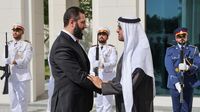In a significant development for air travel and diplomatic relations, the United Arab Emirates (UAE) has announced the resumption of flights to Syria, marking a notable shift in regional dynamics. The General Civil Aviation Authority (GCAA) revealed on April 14, 2025, that joint coordination is underway to finalize the necessary procedures for restarting flights between the two nations. This move is expected to enhance air traffic and facilitate the movement of passengers and cargo between the UAE and the Syrian Arab Republic.
The announcement comes in the wake of a prolonged suspension of flights due to the civil war that has ravaged Syria for over a decade. The resumption of air services is seen as a significant step towards normalizing relations with the war-torn country. Ashhad Al-Salibi, head of the Syrian Civil Aviation and Air Transport Authority, previously announced that international flights to and from Damascus International Airport would resume starting January 7, 2025. This marked the first time international flights had operated from Syria since the onset of the conflict.
In January, Syrian Air successfully operated a flight from Damascus to Sharjah International Airport, signaling the beginning of a new chapter for Syrian aviation. The GCAA's recent announcement further emphasizes the UAE's commitment to re-establishing connections with Syria as part of broader efforts to stabilize the region.
In a parallel development, the GCAA of Saudi Arabia also indicated plans to send a team to Syria to prepare for the resumption of flights between the two countries. This reflects a growing trend among Gulf nations to reconsider their positions regarding Syria, which has been largely isolated on the international stage since the onset of its civil war.
Adding to the intrigue surrounding the UAE's renewed engagement with Syria is the recent official visit by Syrian President Ahmed al-Sharaa to the Emirates. His meeting with Abu Dhabi Crown Prince Mohammed bin Zayed was characterized by a warm reception, further indicating a potential thaw in relations. During their discussions at the Al-Shatie Palace, bin Zayed emphasized that "the UAE supports Syria in facing the challenges of the transitional phase," underscoring a commitment to Syria's stability, which he noted is crucial for the entire region.
However, this diplomatic overture has not been without controversy. Social media reactions have been mixed, with many observers expressing confusion and skepticism regarding the UAE's sudden shift in stance towards al-Sharaa's government. Prominent Emirati figures, who previously criticized al-Sharaa and questioned his legitimacy, have abruptly changed their tone, offering praise and welcoming remarks following his visit. This flip in sentiment has raised eyebrows, prompting questions about the underlying motivations driving this diplomatic engagement.
Critics have pointed out the contradictions between the UAE's previous positions—marked by online campaigns of incitement against al-Sharaa—and its current diplomatic gestures. Users on social media have been quick to highlight this shift by comparing past and present statements from Emirati officials, revealing a stark contrast in rhetoric.
Despite the UAE's promotion of the visit as part of a broader initiative for "Arab rapprochement" and reconstruction efforts in Syria, many remain unconvinced. Some analysts suggest that this engagement may represent a strategic repositioning in response to evolving regional and international dynamics, rather than a genuine commitment to supporting Syria. The question remains: is this the beginning of a new alliance, or merely a ceremonial gesture in a politically motivated moment?
As the situation unfolds, the implications of these developments will likely resonate throughout the region. The resumption of flights and the diplomatic engagement between the UAE and Syria could pave the way for increased cooperation and dialogue, potentially altering the landscape of Middle Eastern geopolitics.
In conclusion, the UAE's announcement to resume flights to Syria, coupled with President al-Sharaa's visit, signals a pivotal moment in the ongoing efforts to normalize relations with a country long affected by conflict. While the official narratives emphasize stability and cooperation, the reactions from observers and analysts suggest that skepticism remains about the true intentions behind these diplomatic overtures.


